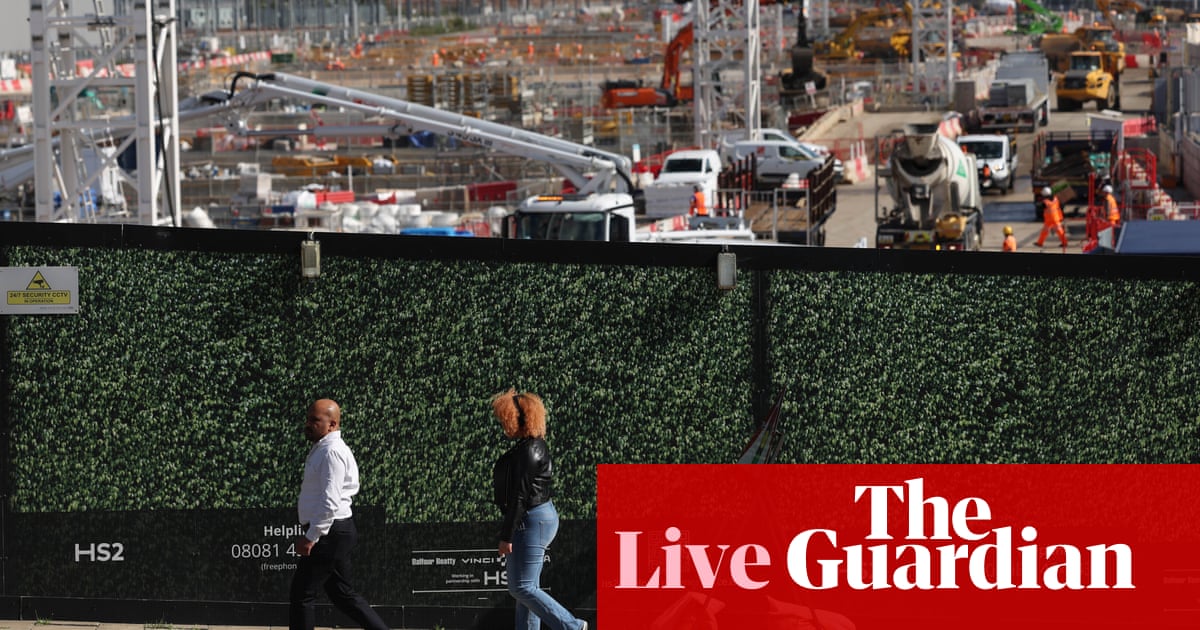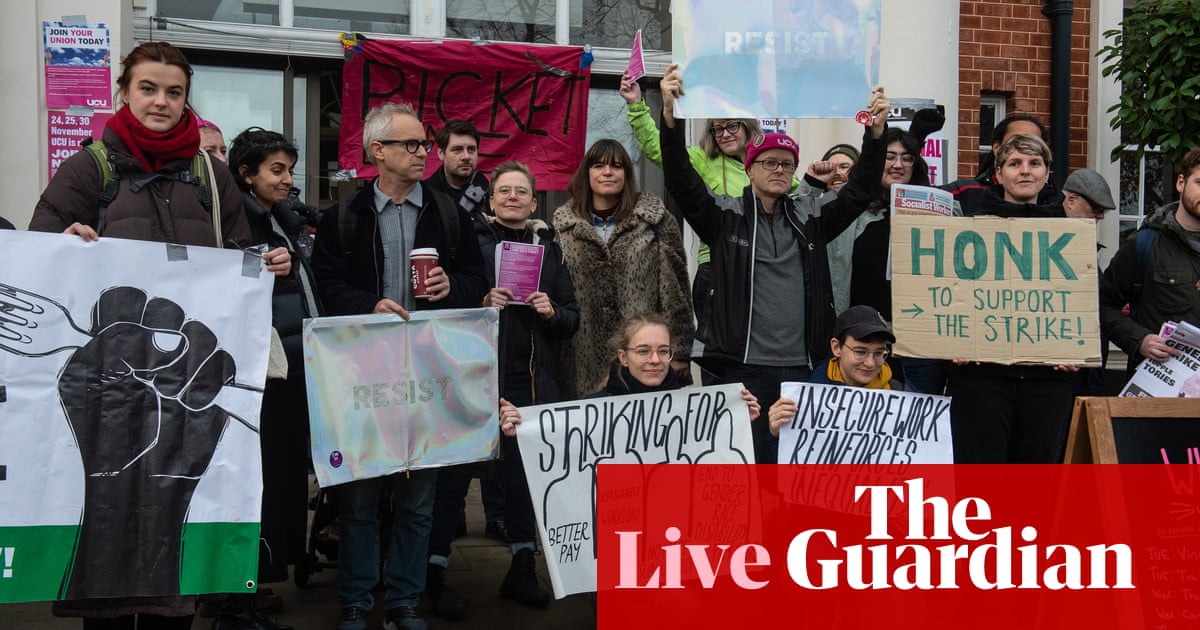
HS2 may end up as total waste of money, says head of Institute for Fiscal Studies
HS2 may be a total waste of money, according to Paul Johnson, the director of the Institute for Fiscal Studies, who said he wishes that it had never got under way in the first place.
Speaking to Times Radio, Johnson said:
This whole thing, it just makes me want to weep. It just makes me despair. I mean, the original sin, as it were, was agreeing to do it in the first place.
It was obviously going to be hugely expensive, with relatively little gain from it relative to pretty much anything else you could have done with the railway or transport system, whether that’s making rail connections across the north vastly better or actually building a bunch of bypasses and improving the roundabouts in the road network. And we knew that this was not the best way you could spend that amount of money. We also know how difficult we find it to build these projects.
I just, as I say, wish it had never happened in the first place.
It rather looks like we’re going to totally waste the money on this in producing a rail at a cost of tens of billions which will get you from Birmingham to central London less quickly than you can do at the moment.
Johnson was referring to reports that Rishi Sunak is planning to axe not just the leg from Birmingham to Manchester, but also the final six-mile stretch going from Old Oak Common to Euston, in central London.
Afternoon summary
Paul Johnson, the director of the Institute for Fiscal Studies, has said HS2 could end up as a total waste of money. (See 2.45pm.) He was speaking as No 10 hinted that the phase two leg from Birmingham to Manchester might be postponed, rather than cancelled outright. (See 12.35pm.)
Rishi Sunak has said armed police need clarity about the legal powers they have, as he backed a review by the home secretary after an unnamed officer was charged with murder over the shooting of Chris Kaba last year.
Eight unions representing teachers and school workers, as well the body for governors, have written to Rishi Sunak demanding an extra £4.4bn annually to ensure buildings are safe for children in England.
One in 10 prisons in England and Wales are barely fit for purpose and should be shut down if alternative buildings can be found, the official watchdog has said.
Wendy Chamberlain, the Lib Dem chief whip, has told her party conference this afternoon that the Lib Dems would stop ministers receiving a pay-off (worth almost £17,000 at the current rate) when they leave office if they have only served in government for a short period of time.
The full list of motions passed at the Lib Dem conference so far is available here.
More than one million NHS appointments have now been cancelled as result of strikes, figures show
The four days of NHS strikes in England earlier this month impacted almost 130,000 inpatient and outpatient appointments, PA Media reports. PA says:
The latest data from NHS England means more than 1m appointments have been cancelled as a result of industrial action in the health service, which has been ongoing since December 2022.
Consultants took strike action on 19 and 20 September, and were joined by junior doctors on 20 September. The junior doctors’ strike then continued until 7am on 23 September.
As a result, 129,913 inpatient and outpatient hospital appointments were cancelled in England.
There were a further 3,581 cancellations in mental health, learning disability and community settings also recorded.
The total number of appointments impacted since industrial action began in the health service in December 2022 now stands at more than 1 million.
If community and mental health figures are included, the total rises to 1.1 million – though this will not reflect the overall number of actual cancellations, due to some duplication of data.
Simon Clarke, who was levelling up secretary in Liz Truss’s cabinet and who is one of a minority of Conservative MPs wanting his party to promote housebuilding more aggressively, has congratulated the Young Liberals for getting the Lib Dems to endorse a national housebuilding target. (See 4.14pm.)
A sincere well done to the Young Liberals. On a cross-party basis, this is the right thing to have done. Unbelievable to see MPs like Tim Farron denouncing building homes.
Here is a question from a reader.
Sunak seems to be acting much more boldly. Do you have any insight into the change in his behavior? He seems to think he suddenly has acquired a mandate. Do you think that being in the position for a year is part of that, or is it something else?
The reader is right. After almost a year in No 10, which has seen Rishi Sunak announce bold initiatives on small boats and the Northern Ireland protocol, but during which he has mostly just stuck to his mainstream five priorities, within the last week or so there’s been an upgrade and a much more interesting Sunak 2.0 has emerged. In some respects, this involves tacking to the right (net zero, inheritance tax), but in other respects he is taking positions that are not particularly ideological and which could conceivably come from a Labour counterpart (HS2, smoking, A-levels).
Why, and why now? I think three factors explain what’s going on.
1) A conference rethink. Party leaders devote a huge amount of time to preparing their party conference speech, out of all proportion to the attention it gets. That is because it is one of the few moments when they can define themselves, at length, in the round, in their own terms, and guarantee a hearing from the media, and from the country at large. And Sunak has never delivered a speech to the Tory conference as leader, and so for him the pressure is particularly intense. He will have spent the summer thinking about the speech, and about what he wants to say about what he stands for.
2) Looming election. We’re now in the long phase of the general election, and Sunak needs a message that might give him some hope of winning. He has not had one until now. That’s because of his …
3) Dire ratings. Sunak’s priority as PM over the past 11 months has been to deliver stability and competence – qualities that were notably missing under his last two or three predecessors. You could call it the “not being useless” strategy. But, even though he has made the government more professional, he has not made it any more popular. If he is to have any chance at all of winning, he needs to try something else. That’s what he’s up to.
Former DPP questions need for Home Office inquiry into rules governing firearms officers using weapons
Ken Macdonald, a former director of public prosecutions, has questioned the need for the review ordered by the Home Office of the rules governing when it is lawful for firearms officers to use their weapons. (See 1.45pm.)
In an interview with the World at One on Radio 4, Macdonald, who is now a peer, said that the law already protects police officers who are acting in self defence. He told the programme:
If it’s being suggested that there should be additional protections for police officers over and above the normal protections which are available to all citizens, that’s quite a quite a tricky suggestion. And it’s quite difficult to conceive what those additional protections would be.
Of course, the police are perfectly entitled to use force within the rules. They’re typically entitled to exercise force in respect of self defence, and the laws that apply to all of us apply to the police.
If you start to create special laws protecting police officers who were involved in the use of force, and sometimes lethal force, then that might begin to call into question public confidence in the activities of police officers.
Macdonald said the law of self defence says “if a person does no more than they instinctively believe is necessary to protect themselves or another person from harm, then that’s the strongest evidence a court has that they are acting in lawful self defence”. That was “a broad and generous defence”, he said.
Macdonald also said that when prosecutors consider whether to charge officers who have used guns while on duty, they consider they pressure firearms officers are under
[Prosecutors] have to factor in very, very carefully, as I always did, the stress the police are under, the danger they’re under, the fact that they’re putting themselves at risk for all of us, and their courage.
That’s precisely why it’s so rare, so vanishingly rare, for police officers to be charged in these circumstances. I don’t think I ever authorised a charge against a police officer in these circumstances for precisely those reasons.
Macdonald stressed that he was not commenting on the case of the officer charged with murder following the shooting of Chris Kaba. But he said that for an officer to be charged like that was “extremely unusual”.
However Sir Mark Rowley, commissioner of the Metropolitan police, has welcomed the review. In an open letter to the home secretary released yesterday, he said he was glad the review was taking place.
He implied that he was particularly keen to see changes to the rules governing how inquests and misconduct hearings deal with officers accused of firing guns without justification, but he also said he wanted the inquiry to investigate “how CPS [Crown Prosecution Service] policy can strengthen the legal protection for officers who use force”.
As Peter Walker points out, a defeat for the party leadership at a Lib Dem conference does not generate feuding on anything like the scale that it does at Labour conference.
Lib Dem leadership defeated! Conference votes to restore national housing targets. A pushback against Operation Don’t Frighten the Tories.
In any other party this would count as civil war. But seeing as it’s the Lib Dems, I fully expected to see Tim Farron and Rob Blackie doing a drunken duet at Glee Club later.
At the Conservative party conference, of course, there are no defeats, because members never vote on anything.
Lib Dem leadership suffers defeat at conference as members vote to retain national housebuilding target
All three amendments, including the “rebel” one committing the party to having an annual housing target of 380,000 new homes a year, have passed. (See 4.02pm.) And the motion as amended has passed too.
At the Lib Dem conference members are now voting on the housing motion, and on the amendments to it.
Tim Farron booed at Lib Dem conference as he dismisses call for national housingbuilding target as "Thatcherism"
Here is the document with the motion on housing that Liberal Democrat members are currently debating, with the amendments.
Amendment one says: conference maintains its commitment to a national housing target of 380,000 new homes per year, to set a clear direction of travel and to indicate serious intent to address the housing crisis.
Conference believes that local housing targets need to exist as part of delivering an overall national target; local and central government share responsibility for delivering the housing we desperately need. Local planning authorities should cooperate at regional or sub-regional level to ensure that they deliver homes where they are needed.
The debate was opened by Helen Morgan, the MP for North Shropshire. According to PA Media, as she said the Lib Dems would “build 150,000 new homes for social rent every year”, there were shouts of “Where?”
There were also boos when she said:
National housing targets do not work. They didn’t work a decade ago … they won’t work in the future.
Moving amendment one, Janey Little, chair of the Young Liberals, said young people wanted national housing targets. She said:
We as young people feel ignored and let down by those at the top of our party. This is not the first time we have had to plead our case.
But Tim Farron, the former party leader, described the Young Liberals’ amendment as “Thatcherism”. He said:
If there was a credible amendment today to build 380,000 council houses a year, I would back it.
I reckon I can get away with being a rebel again now, I do not give a monkey’s, but amendment one does not do that. It is a vague and vacuous target, and we have had vague targets for years – they are not radical, they are not liberal, they are not new, they are not effective.
Vague targets let and empower developers to build the houses that they want but never … the homes that we desperately need, especially that young people actually need. The authors of amendment one do not mean it, but it is pure Thatcherism.
Farron was booed at this point. But he described the amendment as an “electoral gift to the Tories, including right now in Mid [Bedfordshire]”, adding:
I will take the hit to stand up against nimbyism, but I will not take an electoral hit to fight the corner of corporate investors.
Lib Dem leadership faces conference rebellion over plan to drop support for national housebuilding target
In Bournemouth Lib Dem members are debating housing, and as Peter Walker reports, they’re having a proper policy argument about national targets.
Lib Dems are facing a conference-floor rebellion on their abolition of a national target for housebuilding. Top brass say such targets don’t work – lots of members, especially younger ones, disagree, amid fears they are pandering to nimbyism to court Tory voters.
This debate is getting very feisty. Tim Farron, ex-LD leader, just got booed by some delegates and had the mic cut for going over time with a passionate speech against an amendment to restore a national target to the housing policy.
It was, in fairness, a great speech by Farron. National targets, he said, do “naff all” to build houses. He called the amendment “the most right wing thing I’ve seen at Lib Dem conference since we sent Liz Truss off undercover.”
The Liberal Democrats have received a £1m boost to their election war chest after a member left the party money in his will, PA Media reports.
One source said the donation, which is their biggest since 2019, would be “transformational” to the party’s campaign. The windfall, which came from a legacy donation made by deceased former lawyer and longstanding member John Faulkner, is said to be enough to recruit extra staff in dozens of seats, PA says.
A Lib Dem source said:
We are hugely grateful for this donation that will be transformational for the party in winning more seats in the blue wall at the next election.
We have been getting interest from more and more senior business leaders, including former Conservative donors, who are appalled by the actions of this government.
Rishi Sunak trashing his commitments to net zero has underlined that he has turned his back on the business community and the country’s economic future.
Olympic rowing champion James Cracknell will run as a Conservative candidate at the next general election, PA Media reports. The two-time Olympic gold medallist has been confirmed as the Tory candidate in Colchester, where local MP Will Quince is standing down. The Conservatives currently hold a 9,000 vote majority over Labour in the Essex constituency, PA says.












